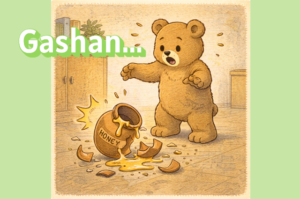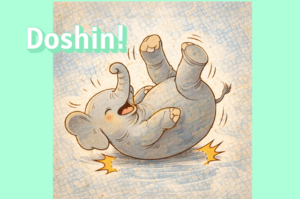Ever dropped a bag full of books on the floor?
That solid, weighty thud — that’s “dosa!”
It’s the sound of something falling heavily and suddenly,
often with a sense of surprise or exhaustion.
Before we dive in, hear what it sounds like!
What is “Dosa” (どさっ)?
“Dosa” represents a heavy object falling or being dropped.
It carries a feeling of suddenness and gravity — the impact is the key.
Used for:
- A bag or box dropping on the ground
- Someone collapsing onto a sofa or floor
- Something landing with weight or force
Nuance:
Strong, physical, sometimes humorous. It’s heavier than dosun or don — like a dull, tired plop.
Pronunciation
do-sah
(Say it short and firm — like the sound of something hitting soft ground.)
Categories
Sound
What Does “Dosa” Look Like?
Like someone collapsing onto the couch after work.
Like a backpack hitting the ground after a long walk.
Like snow sliding off a roof with a dull thud.

Examples in Daily Life
Example 1: Heavy fall
He dropped onto the sofa,
bag still on his back —
dosa!

Cultural Note
In English, you might say:
“thud,” “flop,” or “plop.”
But dosa is more expressive —
it tells you not only the sound, but the weight and tiredness behind it.
It’s an everyday Japanese favorite for lazy collapses and clumsy moments.
Watch & Feel the “Dosa!” World!
Feel the Dosa! — the solid, weighty thud
Heavy luggage sounds “Dosa!” when dropped.
Try Using It!
When you collapse on your bed — say dosa!
When your groceries drop all at once — say dosa!
It’s the perfect sound for “Oops… too tired to care.”













Comments